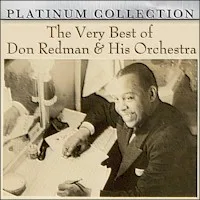Bitrate: MP3@320K/s
Time: 47:47
Size: 109.4 MB
Styles: Big band
Year: 2011
Art: Front
[2:51] 1. Puddin' Head Jones
[3:02] 2. I Found A New Way To Go To Town
[3:02] 3. My Old Man
[2:49] 4. Keep On Doin' What You're Doin'
[2:45] 5. Shuffle Your Feet Bandanna Babies
[3:13] 6. Chant Of The Weed
[2:57] 7. How Ya Feelin'
[2:53] 8. She's Not Bad
[3:13] 9. Underneath The Harlem Moon
[2:51] 10. It's A Great World After All
[3:21] 11. Got The South In My Soul
[2:54] 12. After Sundown
[2:52] 13. Our Big Love Scene
[2:57] 14. Try Getting A Good Night's Sleep
[2:55] 15. Two Time Man
[3:04] 16. Tired Of It All
Redman was born in Piedmont, Mineral County, West Virginia. His father was a music teacher, his mother was a singer. Don began playing the trumpet at the age of three, joined his first band at the age of six and by the age of 12 was proficient on all wind instruments ranging from trumpet to oboe as well as piano. He studied at Storer College in Harper's Ferry and at the Boston Conservatory, then joined Billy Page's Broadway Syncopaters in New York City. (He was the uncle of saxophonist Dewey Redman, and thus great-uncle of saxophonist Joshua Redman and trumpeter Carlos Redman.)
Career
In 1923, Redman joined the Fletcher Henderson orchestra, mostly playing clarinet and saxophones. He soon began writing arrangements, and Redman did much to formulate the sound that was to become swing. A trademark of Redman's arrangements was that he harmonized melody lines and pseudo-solos within separate sections; for example, clarinet, sax, or brass trios. He played these sections off each other, having one section punctuate the figures of another, or moving the melody around different orchestral sections and soloists. His use of this technique was sophisticated, highly innovative, and formed the basis of much big band jazz writing in the following decades.
In 1927 Jean Goldkette convinced Redman to join the Detroit, Michigan-based band McKinney's Cotton Pickers as their musical director and leader. He was responsible for their great success and arranged over half of their music (splitting the arranging duties with John Nesbitt through 1931). Redman was occasionally featured as their vocalist, displaying a charming, humorous vocal style.
Redman then formed his own band in 1931, which got a residency at the famous Manhattan jazz club Connie's Inn. Redman signed with Brunswick Records and also did a series of radio broadcasts. Redman and his Orchestra also provided music for the animated short I Heard, part of the Betty Boop series produced by Fleischer Studios and distributed by Paramount. Redman composed original music for the short, which was released on September 1, 1933. The Brunswick records Redman made between 1931–1934 were some of the most complex pre-swing hot jazz arrangements of popular tunes. Redman's band didn't rely on just a driving rhythm or great soloists, but it had an overall level of arranging sophistication that was seldom heard by other black bands of the period. The popular vocalist, Harlan Lattimore, provided about half of the vocals during this period.
The Very Best Of Don Redman & His Orchestra








